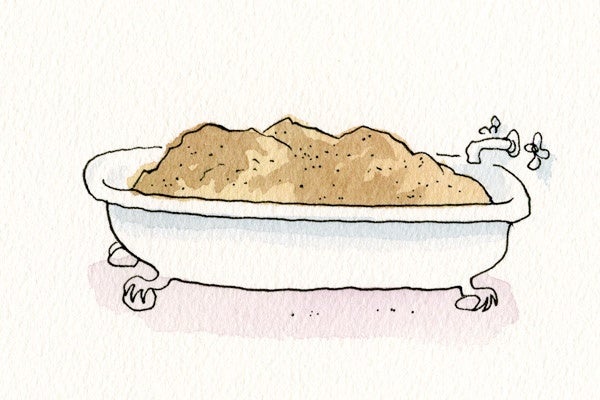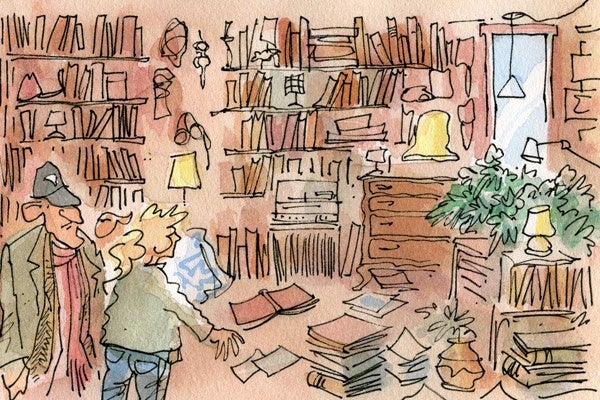Certain Poor Shepherds, Scene 5: Tomato soup, good dirt and Amadeus
In Day 5 of “Certain Poor Shepherds,” our Christmas tale by Chris Satullo and Tony Auth, our heroine Nora Gallagher visits her new, eccentric friend Tony Razzolini’s apartment for lunch.
Part five of a seven-part holiday fiction
The story so far: Young Nora Gallagher, coping with work stress and a boyfriend with commitment problems, has focused her emotions on an eccentric old man she met one night in Franklin Square. Against her friends’ advice, she’s accepted the fellow’s invitation to a “festive holiday lunch.”
It was a sun-splashed December day, so Nora Gallagher was walking from More Than a Roof’s offices to the senior apartment complex in Old City where Tony Razzolini lived. She was due for lunch “noonish.”
She felt her phone buzz in the pocket of her pea coat. Greg, texting, again.
Did i leave my Packers jacket at ur place? Got plane out on Sat. from phl. Will sta w/u Fri. Do something?
Nora’s stomach gave a little flip: Greg had decided to fly out of Philly instead of Newark, so he could see her. Could this be it? A Friday night … Greg feeling guilty about abandoning her on Christmas (not that she’d seen any sign of that) … a nice dinner somewhere in NoLibs … a small velvet box with something inside …
Get a grip, Gallagher. You sound like a schoolgirl. He probably booked out of PHL just because he wanted the damn jacket. And you’ve got a band gig Friday. Which you told him and he’s obviously forgot.
She texted back: Yes, it’s in my closet. GCT has a gig Friday.
Before she could return the cell to her pocket, it rang. Her mother.
“Hi, mom.”
“Hello, darling. How is your work day going?”
“Pretty slow; taking a walk to lunch.”
“Oh, that’s nice. I was just calling to make sure you’ve sent a Christmas card to your Aunt Doris. You know it means a lot to her.”
This was Charlotte’s fourth reminder on the Aunt Doris front. Nora had sent a card each time, in one of those paradoxical revenges her mother seemed to inspire in her. Poor Doris was probably wondering how many great-nieces named Nora she had.
“Sure, Mom, thanks. It’s sent. Anything else I can do for you?”
“Well, it would be really such a help if you could pick up a few things for me at diBruno Brothers and bring them out on the weekend. Do you mind?”
“Sure, no problem. But, Mom, email me the list, could ya, because I’m walking now and I can’t take it down.”
“Uh, OK, darling, What is your email address again?”
“Same as the last five years, Mom, ngallagher@moreroof.org.”
A gift for the wrong move
Nothing made Nora feel older than a self-absorbed text from her non-fiance; nothing made her feel more like a tormented teen than a call from her mother. She waited for a light to change, feeling whiplash.
Nora’s friends loved her mom, who always seemed sunny and poised, with the scent of vanilla and fresh baking about her. But Nora could never shake the sense that, in her reserved way, Charlotte always was feeling profound disappointment in her middle daughter over a skein of wrong choices: field hockey, not tennis; Wellesley, not Smith; Greg, not that charming Jamie Davison; non-profits, not law.
Well, Nora thought, time to give Charlotte another cause to lament. She’d arrived at Tony’s address. The surly guard at the front desk took his sour time taking her photo for the nametag, and directing her to the third floor.
When Nora knocked on 335, she endured another long wait. Sounds of bustle and shouts of annoyance came from inside.
Tony Razz opened the door, clad in his usual layers of jackets, a Carolina Panthers baseball cap perched on his head, stray hairs poking out from beneath the cap.
Tony nodded at Nora, then turned away with a slight shoulder movement that Nora chose to interpret as Come on in.
She closed the door and scanned the studio apartment.
Not in Kansas anymore
It was a cross between a flea market and a jungle. Plants covered every square inch of the recessed sill of room’s one large window, nearly blotting out the light from outside: cacti, jade, zebra plants, tillandsia, rhododendrons. More greenery was scattered at random around the room; a growing light hung over a batch of seedlings on a table.
But that only began to describe the clutter. Shelving rose from floor to ceiling at odd angles, turning the small room into a Mad Hatter’s maze. The shelves were loaded with old books, stacked haphazardly and sticking out at odd angles. Mixed in with them were bobbleheads, plastic swords, Big Gulp cups, and hats – many, many hats – ballcaps, fedoras, watch caps, tams, and several versions of the aviator cap Tony had had on his head the night Nora met him.
At intervals sat lamps, ugly plastic ones, wooden ones with battered lampstands, Ikea’s earliest model desk lamp – on and on. Several were lit, even in midday, others lacked bulbs, cords or both.
To the right, on the kitchenette sat enshrined an old record turntable, with a stack of vinyl albums next to it and a contingent of Flintstone juice glasses standing guard on the perimeter.
A cough came from Nora’s left; Tony’s bed was shoved up against that wall. Peering around a crooked bookcase, Nora spied a large, lumpy shape on the bed– like the Minotaur at the end of the labyrinth.
Tony Razz gestured toward the shape, which Nora’s eyes slowly recognized as human: “That’s Dorothy. My … girlfriend. My paramour, my mistress, my main squeeze.”
“I ain’t no mistress of youse,” Dorothy spoke, then turned toward Nora: “Pleased to meet ya, Miss Gallagher. You are a bit stouter than I thought you’d be.”
“Uh, well, uh … nice to meet you, too, Dorothy.”
“Tony here’s been carrying on like the Queen of England was visitin’, ya know.”
“Shut up, woman,” Tony hissed. Then, he fussed over the papers stacked on a chair, trying to clear it off for Nora. “Here, fair maid of the fountain, sit. Let me prepare our festive lunch.”
Which turned out to be some tomato soup from a red-and-white can, some saltines and a generic diet cola. While Tony labored in the kitchenette, Dorothy quizzed Nora ceaselessly on her family, drilling down to questions about where cousins had attended high school.
“Myself, I never go that sheepskin,” Dorothy said. “Had to go marry Mr. Phillips, I did, yeah. Had to go get myself knocked up. Ah well, that’s how life goes sometimes.”
With that philosophical insight, Dorothy pushed her thick, black, cat’s-eye glass frames back on her nose, tugged on her left ear, interlaced her bloated fingers across the enormous prow of her bosom, which was covered by a flowered blouse of riotous hues.
And promptly fell asleep.
Music hath charms
Nora primly spooned some soup up from the tray on her lap. She assured Tony that it was really quite good. She noticed a poster of an Alaskan glacier, hung neatly on a wall. He followed her eyes:
“Ahhh, the 49th state. There 20 years. U.S. Army. Meteorological service. Before Sarah Palin, I helped keeped America safe. A true Palintologist.”
Tony chuckled, then his eyes went distant again. “My daughter. Born in Anchorage.” “
Whole new chapters of the book of Tony tumbled into view.
“Daughter? What’s her name? Where is she now? And your wife?”
Tony stared the poster, made no reply. He was deep in a fugue state.
After a few minutes, he shook his head vigorously and clambered to his feet.
“Some Mozart?” Tony asked. “Some whispers from Olympus, the humming of the gods?”
He shuffled over to the counter, set down his canes, delicately lifted the plastic cover on the turntable, reverently lifted the vinyl out of the cover and over the spindle. As the album dropped to the spinning disc, he stepped back three paces, tilted his head closed his eyes and raised his arms.
The sprightly opening phrase of Mozart’s 40th Symphony sounded: Da da dum, da da dum, da da dum dum, dadadumdadadumdadadaaaaa.
Tony’s arms began to move in perfect time to the music. He was conducting, and it was clear he knew the score by heart. Eyes shut, bliss on his face, Tony gestured emphatically to cue in woodwinds, violas and so on.
Zzzzzz-angggghhh-anggghhh. One section, discordant, was not following Tony’s imaginary baton. From the bed, Dorothy was snoring loudly.
The first movement reached its glorious close. Nora walked her bowl and Flintstone glass over to the kitchen sink, then set to work washing that day’s dishes and those from who knows how many days before. Then she set to work on the countertop’s month-deep grunge. She finished just as the third movement did.
Wiping her hands on a paper towel, she asked, “Can I use your bathroom”” She followed his pointed finger, then stopped dead in the doorway. The lime-green tub had no shower curtain; it was filled nearly to the brim with … rich brown dirt.
“Tony, wh—what is this?”
He clattered up behind Nora, peered around her: “Oh, that’s for my plants and flowers. My greenish bower, my lush verdure. Got my hands on some really good dirt a few months away; couldn’t let that get away, could I?”
“But when and where do you bathe?”
“Achhhh, when I need to I do that, I go to Dorothy’s.”
“So, she doesn’t live here?”
“Live with her, in sin? Heaven forfend, my dear,” Tony crossed himself with his right hand while comically rolling his eyes. “The authorities here already persecute me day and night; sneaking a paramour in here would only give them ammunition. Praise the Lord and pass the ammunition. Black Jack. Verdun here. It’s all over. …”
And he was off …
A scent of Yule
“Tony, Tony! Look at me. I have to go now but before I do I wanted to ask you something.”
“Anything, fair maid.”
“Not a favor. An invitation. Every year my mother has a very nice party for Christmas Eve at her house out on the Main Line. I’d like to bring you to it. You’d be my date, sort of.”
“Your date?!” Tony’s eyes brightened, then darted furtively towards Dorothy’s slumped and snoring figure.
“It’ll be our secret, Tony. Promise. Pick you up next Monday around 5 p.m.?”
“On your bicycle?” Tony looked alarmed.
“No, no, silly, I’ll get CarShare. We’ll ride in style to Gladwyne.”
His eyes clouded. “Don’t know. Don’t know. They might have sentries posted at the suburban gates, to keep poor Razzolini out. All quiet on the western front. The guns of August, in December. Too dangerous. Too risky.”
“Nonsense. Monday at 5. Wear your best tweed, OK, Tony Razz?”
“OK, best tweed. Boss Tweed. Tammany Hall. Tweedledee, tweedledum. Humpty in surgery; procedure worked, patient died. So sad, so sad.”
“Tony …. Come back to me now.”
“Best tweed. 5 p.m. Monday. Got it.”
But his face was anxious.
“Don’t be so glum. Lunch was great.” Nora bent and kissed him on the forehead. “See you soon.”
The door closed upon Tony’s look of complicated amazement.
Tomorrow: Tony Razz invades Gladwyne.
Listen to the radio play version of Certain Poor Shepherds, on WHYY-FM, at 10 p.m. Dec. 23, 1 p.m. Christmas Eve, 6 p.m. Christmas Day, or with the audio player above. Starring Marty Moss-Coane, Dave Heller and other members of the WHYY team.
WHYY is your source for fact-based, in-depth journalism and information. As a nonprofit organization, we rely on financial support from readers like you. Please give today.




